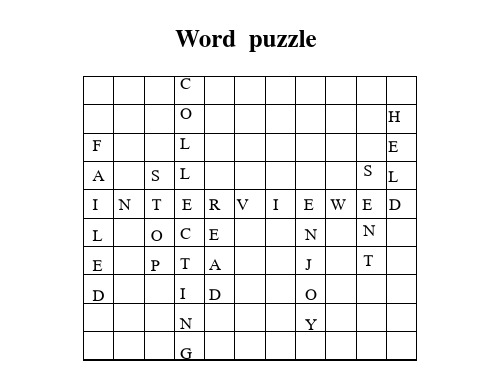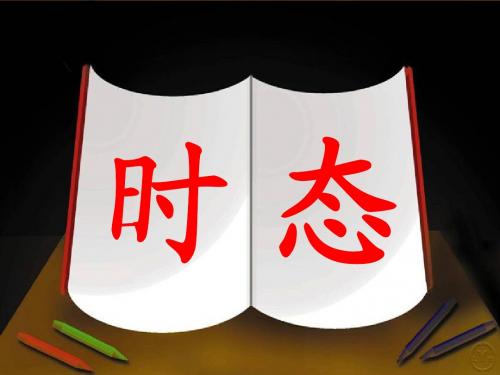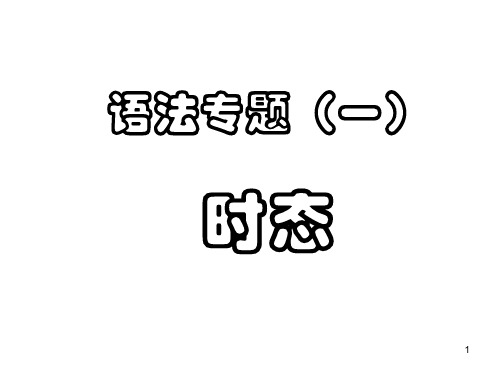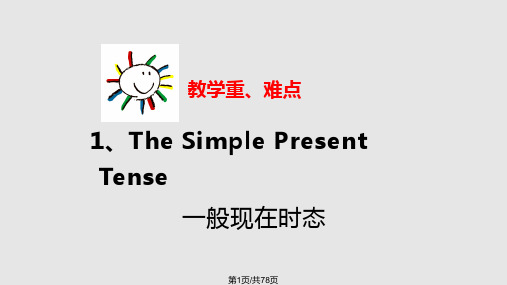初中英语八种时态归纳PPT
合集下载
初中英语八种时态讲解-课件PPT

什么情况下用?
①表示经常或习惯性的动作或存 在的状态。②表示主语通常的能 力、兴趣爱好、和性格特征。③ 表示客观的事实或真理。④表示 按照时刻表或已经计划安排好的 将来行为。(只限于是go, come, leave, arrive, begin, start, take off, stop, be等表示开始或移动意义的 词。)⑤在时间状语从句和条件 状语从句中,主句用一般将来时 (will+动词原形),从句中用一般
变“y”为“i”再加-ed
worry→worried
cry→cried
1. He____(be, was, were, been) here a moment ago. 2. They ____(be, was, were, been) here just now. 3. The scientists _____(leave, leaves, leaved, left) for America yesterday. 4. Last week we ______(visit, visited ) the Science Museum. 5. When I was a child, I often ____(play, played) football. 6. The students ran out of the classroom as soon as the bell ____(ring, rang, rung).
一般过去时
概念:过去某个时间里发生的动作或 状态;过去习惯性、经常性的动作、 行为。 时间状语:ago, yesterday, the day before yesterday, last week(year, night, month…), in 1989, just now, at the age of 5, one day, long long ago, once upon a time, etc. 基本结构:①be动词;②行为动词 否定形式:①was/were+not;②在行为 动词前加didn't,同时还原行为动词。 一般疑问句:①was或were放于句首; ②用助动词do的过去式did 提问,同时 还原行为动词。
英语时态8种基本时态讲解.ppt课件

4)动词过去式变化规则。 a)一般情况下的词加-ed. work---worked call----called b)以不发音的字母e结尾的单词直接加-d . live----lived change----changed smoke----smoked die----died graduate----graduated drive----drove
8.过去完成时 表示动作发生在过去某一时间之前已经完成的动作或状态, 强调“过去的过去”, 常与 by the time, by the end of…,before , by 等引导时间的状语连用。
基本结构 主语+ had + 动词过去分词 + 其他成分 When I got to the cinema yesterday the film had begun already. He had learned English before he came here.
现在完成时与一般过去时的区别: 1)现在完成时侧重于对现在的影响;而一般过去时侧重于某一动作发生在过去某个时间或某段时间。即现在完成时侧重于现在的结果,而一般过去时侧重于动作发生的时间。例如:
I have seen the film. 我看过这部电影。(现在我仍记得电影的内容) I saw the film three days ago. 三天前我看了这部电影。(强调是三天前,而不是别的什么时候看的电影)
be going to含有“打算,准备”的意思,而will则没有这个意思, She is going to lend us her book. He will be here in half an hour.
be about to+V.原形(意为马上做某事,在时间上指最近的将来) I am about to leave school. 不能与表示时间的副词连用。 They are about to set out.(√) They are about to set,变y为i加-ed. study----studied carry----carried cry----cried try----tried d)以元音字母+y结尾的单词直接加-ed. play----played stay----stayed
8.过去完成时 表示动作发生在过去某一时间之前已经完成的动作或状态, 强调“过去的过去”, 常与 by the time, by the end of…,before , by 等引导时间的状语连用。
基本结构 主语+ had + 动词过去分词 + 其他成分 When I got to the cinema yesterday the film had begun already. He had learned English before he came here.
现在完成时与一般过去时的区别: 1)现在完成时侧重于对现在的影响;而一般过去时侧重于某一动作发生在过去某个时间或某段时间。即现在完成时侧重于现在的结果,而一般过去时侧重于动作发生的时间。例如:
I have seen the film. 我看过这部电影。(现在我仍记得电影的内容) I saw the film three days ago. 三天前我看了这部电影。(强调是三天前,而不是别的什么时候看的电影)
be going to含有“打算,准备”的意思,而will则没有这个意思, She is going to lend us her book. He will be here in half an hour.
be about to+V.原形(意为马上做某事,在时间上指最近的将来) I am about to leave school. 不能与表示时间的副词连用。 They are about to set out.(√) They are about to set,变y为i加-ed. study----studied carry----carried cry----cried try----tried d)以元音字母+y结尾的单词直接加-ed. play----played stay----stayed
中考英语专题 --八种常见动词时态讲解(共49张PPT)

二、一般过去时
1.一般过去时的结构:
主语+动词过去式+其它
I did my homework yesterday.
(did就是do的过去式) 否定构成:didn’t+动原 一般疑问构成及简答举例:Did+主语+动原+其它? 特殊疑问句举例:What did he do yesterday? When did he get up this morning?
火车明天上午六点开。
6)在复合句中,当主句是一般将来时,时间状语 从句或条件状语从句的谓语动词只能用一般现在 时来表示将来。 例如: I'll tell him the news when he comes back. 他 回来时,我将告诉他这个消息。
If you take the job , they will talk with you in greater details. 如果你接受这份工作,他们将和你谈谈细节。
I do my homework every day.
1.改为一般疑问句并回答。 Do you do your homework every day? Yes, I do./No, I don't. 2.改为否定句。 I don't do my homework every day.
Jim does his homework every day. 1.改为一般疑问句并回答。 Does Jim do his homework every day? Yes, he does./No, he doesn't. 2.改为否定句。 Jim doesn't do his homework every day.
英语八大时态PPT课件(详细版)

b
15
He is a lazy man . He ____the dirty jeans every day.(2014 )
A. always wears B. always wearing C. always to wear D. is always wearing
You will know the truth after you ___him.(2013) A. see B. will see C. are seeing D.to see
b
16
三、一般过去时
1、构成 一般过去时用动词的过
去式表示。除系动词be的过去式 有人称和数的变化外,其他动词 的过去式无人称和数的变化。
b
17
2、用法
※表示过去已经发生的动作,现在 已经结束,常与相应的过去时间状 语连用。 Tom fell ill last night , and he had to stay at home.
【翻译】
我今年20岁,住在北京。 I am twenty years old this year , and I live in Beijing.
火车将在一个小时后(in an hour)出发(set off)。 The train sets off in an hour.
她每天都走路上学。 She walks to school every day. 或:She goes to school on foot every day.
If it doesn’t rain tomorrow,we’ll
go shopping.
பைடு நூலகம்
b
6
常与一般现在时连用的时间状语有:
often 经常
初中英语八种时态归纳PPT

10. About 400 years ago, Galileo proved that the earth travels (travel) around the sun.
Part B 语态
Active Voice
Passive Voice
主动语态
1. Many people speak English.
At the party.
--- I _l_ik_e___ your jacket, Tim. How long _h_a_v_e_y_o_u__h_a_d__ it?
Oh…er… I __b_o_u_g_h_t__it last week. W__o_u_l_d_y_o_u__li_k_e_ to dance, Becky? ---Phew. It’s __h_o_t__ here. --- Put your jacket on the chair. You ____n_e_e_d_n’wt orry. It’ll be ok. ---That’s _b_e_tt_e_r __.
8. Mr. Green and his wife had lived (live) in London for a few years before they came (come) to work in China in 2001.
9. He said he w__o_u_ld__n_o_t_s_p_e_a(k not,speak) at the meeting the next day.
4. Hurry! Your classmates _a_r_e_w__a_it_i_n_g(wait) for you in the classroom..
1. This is the third time you _h_a_v_e__b_e_e_n__(be) here.
Part B 语态
Active Voice
Passive Voice
主动语态
1. Many people speak English.
At the party.
--- I _l_ik_e___ your jacket, Tim. How long _h_a_v_e_y_o_u__h_a_d__ it?
Oh…er… I __b_o_u_g_h_t__it last week. W__o_u_l_d_y_o_u__li_k_e_ to dance, Becky? ---Phew. It’s __h_o_t__ here. --- Put your jacket on the chair. You ____n_e_e_d_n’wt orry. It’ll be ok. ---That’s _b_e_tt_e_r __.
8. Mr. Green and his wife had lived (live) in London for a few years before they came (come) to work in China in 2001.
9. He said he w__o_u_ld__n_o_t_s_p_e_a(k not,speak) at the meeting the next day.
4. Hurry! Your classmates _a_r_e_w__a_it_i_n_g(wait) for you in the classroom..
1. This is the third time you _h_a_v_e__b_e_e_n__(be) here.
初中8个时态 ppt

一般现在时用法 习惯活动 现在情况 客观事实 主将从现
I get up at six every morning. They are very busy. He needs help. The moon moves round the earth. We’ll go there if it doesn’t rain. He’ll call you when he arrives.
现在完成时用法
I can’t find my pen. I have lost 过影响现 it. Have you finished it yet ? He has worked here for a year. 过延到现 I have been in this school since 1999 . He has been to China twice. 两“去” He isn’t here. He has gone to the library.
①一般现在时:表示现在经常反复发生的动作、存在 的状态或习惯性的动作。动词写原形或第三人称单数 形式,即主语为第三人称单数时,动词一般要加-s/es, 与名词复数规则构成类似。如果动词为行为动词,构 成问句、否定句需加助动词/do/does;一般现在时的 时间标志词有: often,always,sometimes,usually,every day,on Sundays等;另外表示主语具有的性格、能力、特征, 表客观事实和普遍真理,表现在发生的具体动作等也 用一般现在时;在时间和条件状语从句中常用一般现 在时代替一般将来时;预先计划安排好的将来行为也 可用一般现在时;状态感觉动词如:be,love,want, hope,understand等只用一般现在时,不用进行时。
过去完成时,表示在过去某一时间或动作之 前已完成的动作或存在的状态。过去完成 时的构成为:had+done;过去完成时的时 间状语常用by加过去点时间,by the end of 加过去段时间,before加过去点时间表 示,有时用when,before,after等引导的 时间从句中。
初中英语八种时态解PPT课件

什么情况下用?
①表示经常或习惯性的动作或存 在的状态。②表示主语通常的能 力、兴趣爱好、和性格特征。③ 表示客观的事实或真理。④表示 按照时刻表或已经计划安排好的 将来行为。(只限于是go, come, leave, arrive, begin, start, take off, stop, be等表示开始或移动意义的 词。)⑤在时间状语从句和条件 状语从句中,主句用一般将来时 (will+动词原形),从句中用一般
1. He______(be, am, is, are) a teacher at No. 2 Middle School. 2. He______(have, has) classes in the afternoon. 3. He______(get, gets) up at half past six every morning. 4. He always _____(come, comes ) to school on time. 5. He ______(study, studies) very hard at his lesson. 6. One and two _____(be, is, are) three. 7. Blue and yellow _____(make, makes) green. 8. The earth _____(move, moves) round the sun. 9. I will go there if I ____( be, will be, am, is, are) free tomorrow.
初中英语八种时态解
一般现在时 一般过去时 现在进行时 过去进行时 现在完成时 过去完成时 一般将来时 过去将来时
一般现在时
一、一般现在时:
初中英语语法—时态(28张) PPT课件 图文

(4)现在完成时与表示一段时间的for短语、since短语或从句等 时,应注意句中的谓语动词须是延续性的,而不能是非延续性动词,如 come→be here,go→be there,die→be dead,borrow→keep,buy→h ,join→be in,leave→be away,begin to study→study等。
6.过去进行时
(1)概念:表示过去某一时刻或某一时间段内正在进行的动作。 (2)构成形式:was/were+动词的-ing形式 ①表示往返、位移的动词的过去进行时常可用来表示过去将来时
时态 We wanted to tell her that the train was_leaving an hour later.
1.一般现在时
基本用法: (1)表示经常性、习惯性的动作; He always helps others. 他总是帮助别人。
时态 (2)表示现在的情况或状态;
He is a teacher. 他是个老师。 (3)表示客观事实和普遍真理。 The sun rises in the east. 太阳从东边升起。 构成形式:am/is/are或实义动词的原形(主语是第三人称单数时,动 词要用第三人称单数形式)。
时态 (2)构成形式:have/has+动词的过去分词。
(3)与现在完成时连用的时间状语有for a long time,recently,yet, lately,ever,never,already,since,by this time,before,just,in t past/last few years,since+过去的时间点,since+时间段+ago,since +从句(一般过去时)。
表示感觉的动词。如:see,hear等。 表示喜欢或厌恶的动词。如:like,love等。 表示希望的动词。如:want,would like等。
初中英语八种时态讲解(课堂PPT)

carry→carries
fly→flies
9
1. He______(be, am, is, are) a teacher at No. 2 Middle School. 2. He______(have, has) classes in the afternoon. 3. He______(get, gets) up at half past six every morning. 4. He always _____(come, comes ) to school on time. 5. He ______(study, studies) very hard at his lesson. 6. One and two _____(be, is, are) three. 7. Blue and yellow _____(make, makes) green. 8. The earth _____(move, moves) round the sun. 9. I will go there if I ____( be, will be, am, is,
词。)⑤在时间状语从句和条件 状语从句中,主句用一般将来时 (will+动词原形),从句中用一般
现在时表将来。(主将从现)6
当主语是第三人称 时,谓语动词要用 第三人称单数形式, 加-s/es。除此之外 都用动词原形。
7
动词第三人称单数 形式变化规则
8
规则
Hale Waihona Puke 例子一般在词尾加-s,(清辅音后 Play→plays 读/s/,在浊辅音后读/z/; leave→leaves 在t后读/ts/,在d后读/dz/。) swim→swims
助动词do提问,如主语为第三人称单数,
初中英语八大时态课件

进行的动作或状态。
02
构成
will/shall+be+动词ing,如She will be studying tomorrow afternoon 。
03
用法
用于描述将来某个时刻的动作或状态 ,如"What will you be doing tomorrow afternoon?"。
现在完成时详解
概念
表示过去发生的动作对现在造 成的影响或结果,常与
already、yet等词连用。
构成
have/has+过去分词,如I have finished my homework。
用法
用来描述已经完成的动作或状态, 如"I have already finished my work."。
现在一般时详解
将来完成时详解
概念
构成
用法
表示将来某个时间点之前已经完成的 动作或达到的状态。
will/shall+have+过去分词,如I will have finished my homework before the exam.
常与by、before等引导的时间状语连 用,表示将来某个时间点之前已经完 成的动作或达到的状态,如"By next year,she will have finished her master's degree."。
表示从将来某个时间开始一直延续 到将来的动作或状态,并可能继续 延续下去。
03
八大时态详解
现在进行时详解
01
02
03
概念
表示现在正在进行的动作 或存在的状态,常与now 、at present等时间状语 连用。
02
构成
will/shall+be+动词ing,如She will be studying tomorrow afternoon 。
03
用法
用于描述将来某个时刻的动作或状态 ,如"What will you be doing tomorrow afternoon?"。
现在完成时详解
概念
表示过去发生的动作对现在造 成的影响或结果,常与
already、yet等词连用。
构成
have/has+过去分词,如I have finished my homework。
用法
用来描述已经完成的动作或状态, 如"I have already finished my work."。
现在一般时详解
将来完成时详解
概念
构成
用法
表示将来某个时间点之前已经完成的 动作或达到的状态。
will/shall+have+过去分词,如I will have finished my homework before the exam.
常与by、before等引导的时间状语连 用,表示将来某个时间点之前已经完 成的动作或达到的状态,如"By next year,she will have finished her master's degree."。
表示从将来某个时间开始一直延续 到将来的动作或状态,并可能继续 延续下去。
03
八大时态详解
现在进行时详解
01
02
03
概念
表示现在正在进行的动作 或存在的状态,常与now 、at present等时间状语 连用。
初中英语八种时态讲解ppt课件

现在时表将来。(主将从现)6
当主语是第三人称 时,谓语动词要用 第三人称单数形式, 加-s/es。除此之外 都用动词原形。
7
动词第三人称单数 形式变化规则
8
规则
例子
一般在词尾加-s,(清辅音后 Play→plays 读/s/,在浊辅音后读/z/; leave→leaves 在t后读/ts/,在d后读/dz/。) swim→swims
助动词do提问,如主语为第三人称单数,
则用does,同时,还原行为动词。
4
什么情况下用?
5
①表示经常或习惯性的动作或存 在的状态。②表示主语通常的能 力、兴趣爱好、和性格特征。③ 表示客观的事实或真理。④表示 按照时刻表或已经计划安排好的 将来行为。(只限于是go, come, leave, arrive, begin, start, take off, stop, be等表示开始或移动意义的 词。)⑤在时间状语从句和条件 状语从句中,主句用一般将来时 (will+动词原形),从句中用一般
work→worked
结尾是e的动词在末尾加-d
like→liked live→lived hope→hoped
末尾只有一个辅音字母的重读闭音 plan→planned 节,先双写这个辅音字母,再加-ed stop→stopped
drop→dropped
结尾是“辅音字母+y”的动词,先 study→studied
11
一般过去时
12
概念:过去某个时间里发生的动作或 状态;过去习惯性、经常性的动作、 行为。 时间状语:ago, yesterday, the day before yesterday, last week(year, night, month…), in 1989, just now, at the age of 5, one day, long long ago, once upon a time, etc. 基本结构:①be动词;②行为动词 否定形式:①was/were+not;②在行为 动词前加didn't,同时还原行为动词。 一般疑问句:①was或were放于句首; ②用助动词do的过去式did 提问,同时 还原行为动词。
当主语是第三人称 时,谓语动词要用 第三人称单数形式, 加-s/es。除此之外 都用动词原形。
7
动词第三人称单数 形式变化规则
8
规则
例子
一般在词尾加-s,(清辅音后 Play→plays 读/s/,在浊辅音后读/z/; leave→leaves 在t后读/ts/,在d后读/dz/。) swim→swims
助动词do提问,如主语为第三人称单数,
则用does,同时,还原行为动词。
4
什么情况下用?
5
①表示经常或习惯性的动作或存 在的状态。②表示主语通常的能 力、兴趣爱好、和性格特征。③ 表示客观的事实或真理。④表示 按照时刻表或已经计划安排好的 将来行为。(只限于是go, come, leave, arrive, begin, start, take off, stop, be等表示开始或移动意义的 词。)⑤在时间状语从句和条件 状语从句中,主句用一般将来时 (will+动词原形),从句中用一般
work→worked
结尾是e的动词在末尾加-d
like→liked live→lived hope→hoped
末尾只有一个辅音字母的重读闭音 plan→planned 节,先双写这个辅音字母,再加-ed stop→stopped
drop→dropped
结尾是“辅音字母+y”的动词,先 study→studied
11
一般过去时
12
概念:过去某个时间里发生的动作或 状态;过去习惯性、经常性的动作、 行为。 时间状语:ago, yesterday, the day before yesterday, last week(year, night, month…), in 1989, just now, at the age of 5, one day, long long ago, once upon a time, etc. 基本结构:①be动词;②行为动词 否定形式:①was/were+not;②在行为 动词前加didn't,同时还原行为动词。 一般疑问句:①was或were放于句首; ②用助动词do的过去式did 提问,同时 还原行为动词。
初中英语八大时态PPT课件

3.My father and mother go out for lunch on Sundays. Do your father and mother go out for lunch on Sundays ?
4.We do our homework after school.
Do you do your homework after school ?
含有be动词的一般过去式
• She is in Beijing. • She was in Beijing . • I am a student. • I was a student. • We are friends. • We were friends.
含有be动词的一般现在时变一般过去时, 把is和am改成was,把are改成were
第3页/共78页
动词第三人称单数形式
·在动词后+s
· 在以s,x,ch,sh,o结尾的动词+es · 以辅音字母+y结尾的动词,
先变y 为i,再加es
·特殊 have-has 等
第4页/共78页
写出下列动词的第三人称单数形式
help s guess es flyies makes leaves fix es swim s know s
第13页/共78页
教学重、难点 2、一般过去时
The Simple Present Tense
第14页/共78页
一般过去时
➢ 一般过去时指动作发生在过去 ➢ 有时候会有例如yesterday, last year等表示
过去时间的标志 ➢ 一般过去时主要要注意动词的变化
be动词和实意动词
第15页/共78页
看那些乌云要下雨了. Loot at the dark clouds. It _i_s_g_o_i_n_g_t_o_rain.
4.We do our homework after school.
Do you do your homework after school ?
含有be动词的一般过去式
• She is in Beijing. • She was in Beijing . • I am a student. • I was a student. • We are friends. • We were friends.
含有be动词的一般现在时变一般过去时, 把is和am改成was,把are改成were
第3页/共78页
动词第三人称单数形式
·在动词后+s
· 在以s,x,ch,sh,o结尾的动词+es · 以辅音字母+y结尾的动词,
先变y 为i,再加es
·特殊 have-has 等
第4页/共78页
写出下列动词的第三人称单数形式
help s guess es flyies makes leaves fix es swim s know s
第13页/共78页
教学重、难点 2、一般过去时
The Simple Present Tense
第14页/共78页
一般过去时
➢ 一般过去时指动作发生在过去 ➢ 有时候会有例如yesterday, last year等表示
过去时间的标志 ➢ 一般过去时主要要注意动词的变化
be动词和实意动词
第15页/共78页
看那些乌云要下雨了. Loot at the dark clouds. It _i_s_g_o_i_n_g_t_o_rain.
英语八大时态PPT课件(详细版)

时态
A
知识导航
种类
一般现在时 一般过去时 一般将来时 现在进行时 现在完成时 过去进行时 过去完成时 过去将来时
构成
do/does did will/shall+动词原形 am/is/are + doing have/has+过去分词 was/were + doing had+过去分词 would/should+动词原 形
A
4
※表示主语所具有的特征、性格、 能力、状态等
She is a middle school student. She looks a little worried. ※某些以here/there开头的句子 中,用一般现在时表正发生的动 作
Here comes the bus.
A
5
※表示将来发生的、时刻表上不改变的事 The train leaves Hunan at five o’clock. ※特殊情况 在时间状语从句和条件状语从句中,若主 句用一般将来时,则从句用一般现在代替 将来。(主将从现)
A
21
四、一般将来时
1、构成 一般将来时态由
“will/shall+动词原形”构成,me to ask Mary for help.
A
22
2、其他表示
※be going to +动词原形:表示 说话人主观的打算或预测。 I am going to look for a job here. It is going to be a fine day for camping tomorrow.
【小试牛刀】 他们昨天这个时候正在吃晚餐。
They were having dinner this time yesterday.
A
知识导航
种类
一般现在时 一般过去时 一般将来时 现在进行时 现在完成时 过去进行时 过去完成时 过去将来时
构成
do/does did will/shall+动词原形 am/is/are + doing have/has+过去分词 was/were + doing had+过去分词 would/should+动词原 形
A
4
※表示主语所具有的特征、性格、 能力、状态等
She is a middle school student. She looks a little worried. ※某些以here/there开头的句子 中,用一般现在时表正发生的动 作
Here comes the bus.
A
5
※表示将来发生的、时刻表上不改变的事 The train leaves Hunan at five o’clock. ※特殊情况 在时间状语从句和条件状语从句中,若主 句用一般将来时,则从句用一般现在代替 将来。(主将从现)
A
21
四、一般将来时
1、构成 一般将来时态由
“will/shall+动词原形”构成,me to ask Mary for help.
A
22
2、其他表示
※be going to +动词原形:表示 说话人主观的打算或预测。 I am going to look for a job here. It is going to be a fine day for camping tomorrow.
【小试牛刀】 他们昨天这个时候正在吃晚餐。
They were having dinner this time yesterday.
初中英语八大时态讲解_图文

2 have been to+地点,表示“去过某地”
。(人已回) I have been to Europe. (I am not in Europe now.)
3 have been in+地点+时间段,表示“在/ 来某地多久”。
I have been in Europe for three weeks. (I am now still in Europe .)
go there get home open close get to know borrow buy
be there be home be open be closed know keep have
1.The film began 5 The film_h_a_s b_e_en_o_n__ for 5
• 9.They got to know 10 They_h_av_e_k_n_o_w_n__since 10
years ago.
years ago.
• 10.I borrowed the book a I_h_a_v_e _k_e_p_t _the book for a
week ago.
week.
二、一般过去时
1.用法:过去的动作或状态。
2.标志词:
yesterday, the day before yesterday,
three days ago, last night/week/month…,in the past;just
now=a moment ago
例题
Li Ming didn’t understand what American people
4.He joined the club 3 He__h_as_b_e_en_i_n__the club for
八大时态讲解(共26张PPT)

概念: 表示过去某一时刻或某一时间
段正在发生的动作。
谓语动词形式 : was/ were+ 现在分词 常用时间状语 :
at this time yesterday, from seven to nine last night, at that moment, etc.
过去进行时的注意点:
在when , while引导的时间状语从句 中, 表示主从句中两个动作同时发生 时, 用过去进行时表示 较长的动作 .
现在完பைடு நூலகம்时的注意点:
1. have been to , have been in 和 have
gone to 的区别 1).Tom _h__a_nsever____bteoeAnmerica
2sh)--.e----_-_S-_oI_s_r_rTh_y_ai,tnsshahebaeretee_hh_nf_ooa_rs_m_tg_eh_o?rSneheeatdnoaxyi,sa. nd
2. 一般过去时态(The Simple Past Tense)
用法:表示过去某个时间发生的动作或存在
的状态
谓语动词形式 : 动词过去式
常用时间状语 :
yesterday, just now, last …, this morning, …ago, etc
一般过去时的注意点:
1、当没有明显的时间状语时,描述几个相继发 生过的动作
过去完成时的注意点:
用于宾词从句中,当主句的谓语动词是一般过去 时时,一定要注意宾语从句中的时态变化。
He said that he _h_a_d_s_e_e_n__the film many times.
8.过去将来时: (The Past Future Tense)
段正在发生的动作。
谓语动词形式 : was/ were+ 现在分词 常用时间状语 :
at this time yesterday, from seven to nine last night, at that moment, etc.
过去进行时的注意点:
在when , while引导的时间状语从句 中, 表示主从句中两个动作同时发生 时, 用过去进行时表示 较长的动作 .
现在完பைடு நூலகம்时的注意点:
1. have been to , have been in 和 have
gone to 的区别 1).Tom _h__a_nsever____bteoeAnmerica
2sh)--.e----_-_S-_oI_s_r_rTh_y_ai,tnsshahebaeretee_hh_nf_ooa_rs_m_tg_eh_o?rSneheeatdnoaxyi,sa. nd
2. 一般过去时态(The Simple Past Tense)
用法:表示过去某个时间发生的动作或存在
的状态
谓语动词形式 : 动词过去式
常用时间状语 :
yesterday, just now, last …, this morning, …ago, etc
一般过去时的注意点:
1、当没有明显的时间状语时,描述几个相继发 生过的动作
过去完成时的注意点:
用于宾词从句中,当主句的谓语动词是一般过去 时时,一定要注意宾语从句中的时态变化。
He said that he _h_a_d_s_e_e_n__the film many times.
8.过去将来时: (The Past Future Tense)
初中英语八大时态总结ppt课件

was/ were +ing。
have/ has + ed。
had + ed。
10
一般现在时 一般现在时,在没有be动词和助动词have,has,
或情态动词的情况下,要变为否定句或疑问句 的时候要借用助动词do或者does。
肯: I work here.
否: I don’t work here.
问:Do you work here?
问:Were you working here?
答:Yes, I was./ No, I wasn’t.
最新版整理ppt
16
现在完成时
肯: I have worked here.
否:I have not worked here. 问:Have you worked here?
答:Yes, I have./ No, I haven’t.
2
一般过去时
含义:过去发生的动 作或事情。例如:我 过去在这工作、我见 过她、我吃了一个苹 果。
最新版整理ppt
3
一般将来时
含义:将来要发生的动 作或状态。 例如:我
将在这工作、我将与她 见面、我将吃掉一个苹 果。
最新版整理ppt
4
一般过去将来时
含义:站在过去谈论将 要发生的事情。 例如:
一个月以前我说过,我 将要来长沙工作。 两个
现在进行时
肯: I am working here.
否:I am not working here.
问:Are you working here?
答:Yes, I am./ No, I am not.
最新版整理ppt
15
过去进行时
肯: I was working here. 否:I was not working here.
have/ has + ed。
had + ed。
10
一般现在时 一般现在时,在没有be动词和助动词have,has,
或情态动词的情况下,要变为否定句或疑问句 的时候要借用助动词do或者does。
肯: I work here.
否: I don’t work here.
问:Do you work here?
问:Were you working here?
答:Yes, I was./ No, I wasn’t.
最新版整理ppt
16
现在完成时
肯: I have worked here.
否:I have not worked here. 问:Have you worked here?
答:Yes, I have./ No, I haven’t.
2
一般过去时
含义:过去发生的动 作或事情。例如:我 过去在这工作、我见 过她、我吃了一个苹 果。
最新版整理ppt
3
一般将来时
含义:将来要发生的动 作或状态。 例如:我
将在这工作、我将与她 见面、我将吃掉一个苹 果。
最新版整理ppt
4
一般过去将来时
含义:站在过去谈论将 要发生的事情。 例如:
一个月以前我说过,我 将要来长沙工作。 两个
现在进行时
肯: I am working here.
否:I am not working here.
问:Are you working here?
答:Yes, I am./ No, I am not.
最新版整理ppt
15
过去进行时
肯: I was working here. 否:I was not working here.
- 1、下载文档前请自行甄别文档内容的完整性,平台不提供额外的编辑、内容补充、找答案等附加服务。
- 2、"仅部分预览"的文档,不可在线预览部分如存在完整性等问题,可反馈申请退款(可完整预览的文档不适用该条件!)。
- 3、如文档侵犯您的权益,请联系客服反馈,我们会尽快为您处理(人工客服工作时间:9:00-18:30)。
like --- I ______ your jacket, Tim. How long have you had it? _____________
you like to Oh…er… I _________it bought last week. Would _____________ dance, Becky? hot here. ---Phew. It’s ______
have cleaned ___________ the room already. had cleaned the room before ___________
arrived.
We will _______ the room tomorrow. 7. 一般将来时: clean
8. 过去将来时: He said he would __________ cleanthe room next
6. By the end of last term, they had worked(work) there for ten years. 7. Mr. Wang was reading (read) a newspaper in the
office at this time yesterday.
Fill in the blanks with the right forms of the verbs given: 1. Last month, in the first match of the 17th World Cup, France was beaten (beat)0-1 by a new team— Senegal. 2. How many fridges have been produced (produce) in China in the last two years? 3. No dictionary should be brought (bring) to the English exam, boys and girls! 4. Tomorrow each of us will be given (give) ten dollars after we finish the work. 5. They were warned (warn) not to touch the machine while they were visiting the workshop.
The past simple tense did had done The present continuous tense The future simple tense will do/ am/is/are doing am/is/are going to do The past continuous tense The future past tense would do was/were doing was/were going to do
When 时间状语从句 1. When the teacher came in , the students ____________(talk) about the film. were talking
2. I met Liming when Iwas ___________(shop) shopping yesterday afternoon. 3. He___________(want) wants to be a teacher when he _________(grow) up. grows
注意:时间状语从句和条件状语从句中用 一般时表示将来。
1. I will wait until he arrives _________( arrive).
doesn’t come (not come)on time, we 2. If he_____________ won’t know what to know. rains 3. I’ll go there unless it _________ (rain). 4. The boy wants to be a writer when he ______(grow) up. grows
needn’t --- Put your jacket on the chair. You ________ worry. It’ll be ok.
better ---That’s _______. Later. ’s been stolen ---Oh,no.My jacket’s gone. It__________ took ---Oh, do you think someone ______ it while we ______________? were dancing
注意:当语句中无时间状语时,要通过上 下文联系,判断语句的时态。
A) 用所给词的正确形式填空:
will go 1.Mr Brown_________(go) fishing as soon as his finishes son________(finish) his lessons tomorrow.
to clean the room We _____ the room every day. clean 1. 一般现在时: cleanedthe room just now. We _______
2. 一般过去时: We ___________ are cleaningthe room now. 3. 现在进行时: cleaning We were ___________ the room at 5:00 4. 过去进行时: Yesterday afternoon. We 5. 现在完成时: We 6. 过去完成时: he
2. Discussion:
What do you think of Tim,Ben, and Becky? Were they right to do what they did?
Why?
Cloze test
The Olympic Games s________ tarted in Greece in eld each four years. 1896. The games are h______ Many people wish the Olympic Games can be wn countries. held in their o_____ nterested in About ten cities are quite i_________ bidding(申办) for the Olympic Games of 2008. “Beijing, Toronto and Paris are the most beautiful c_______bidding ities for the Olympic Games of 2008”, said Richard W Pround, the IOC’s first vice president(副主席)
2. I think he
will be (be) back in a week. are getting 3. We___________(get) ready for the middle— term exam these days.
4.Bill is strict with himself. He always finishes _______(finish) the homework before playing. 5. -- Has your uncle returned (return) the video tapes to Mr Fox yet? --No. They’re still in his bedroom.
4. Hurry! Your classmates __________(wait) for you in the are waiting classroom..
1. This is the third time you have been ___________(be) here. 2. Where is Liming? He has gone ____________(go) to the library.
Part B 语态
Active Voice Passive Voice
主动语态
1. Many people speak English. 2.They found the dinosaur eggs in Liaoning. 3.We must do something to stop the pቤተ መጻሕፍቲ ባይዱllution.
will give 1. I__________(give) the message to her when she comes up. had gone 2. The light ________already ________(go) out when we ______(get) to the cinema. got done 3. When he had ________(do) his homework, he went to bed.
8. Mr. Green and his wife had lived (live) in London for a few years before they came (come) to work in China in 2001. not speak 9. He said he would ____________ (not,speak) at the meeting the next day. 10. About 400 years ago, Galileo proved that the earth travels (travel) around the sun.
二、The passive voices of different tenses
